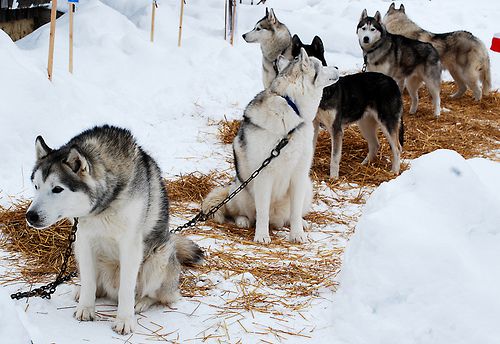Psychotherapy and Instinct: Saving Our Inner Sled Dogs
There’s a story that relates to instinct and case studies, and involving dogs, that has recently come out of Whistler B.C., a town that hosted part of the Vancouver 2010 Winter Olympics. It’s a very sad story of the alleged mass killing in April of last year of nearly 100 sled dogs[WARNING: linked article contains descriptions of graphic, horrific violence] by a sled dog operator in the tourism industry. The alleged callousness and brutality with which the dogs were purportedly liquidated when no longer economically useful has sent waves of horrified disgust through British Columbia and Canada. It raises issues about being connected with our own human instinct that are important in case studies.
The Bond with Dogs
I think that Canadians, Alaskans and other northern people often share a very strong bond to the traditional sled dog, and a very visceral revulsion at the thought that someone would treat them poorly, let alone kill them in such an allegedly wanton manner.
In Canada, a sled dog is a highly symbollic creature. Such dogs and their role go far back in our psyche, millenia prior to the time of history in this country, when the European was not even a dream in the minds of the First Nations people of the North. It is said that humans would have never made it across the Bering Strait land bridge to North America in the ice age, had it not been for the sled dog.
Something Ancient in the Heart
Human connection with dogs is unbelievably ancient: dogs are the first animals that humans ever domesticated. The bond that humans feel with dogs is indissoluble. I often find it both amusing and deeply moving to watch my neighbours walk their dogs up and down our street. This relationship with, say, Sandy, my neighbour’s toy poodle, is only the most recent expression of something ancient in the hearts of both dogs and people, that stretches back into the depths of the Paleolithic era.
What is it that connects humans so powerfully to dogs? What makes us feel such horror that dogs, sled dogs, in particular, could be treated in this manner?
Dog as Instinctual, Affiliative Life
From a Jungian symbolic perspective, animals, and dogs in particular, often symbolize the bodily and instinctual dimensions of human life. While psychologists once discounted human instinct, viewing us as beings who come into this world as a “blank slate”, science now knows much better, thanks to developments in fields like attachment theory and evolutionary psychology.
And so, when they appear in our dreams, for instance, dogs can often symbolize our instinctual side. This may relate to the sexual side of our bodily nature, but it more often relates to the basic need for affiliation and companionship that humans share with dogs, and that we see mirrored in them.
A relationship with a dog can teach a human — and particularly a human child — profound things about what it is to be accepted and loved. The relationship between a figure like a trapper or a hunter, who used to work for long periods in isolation, with only dogs for company would be even more profound, especially when survival might depend on the instinct and strength of those dogs.
Here are some scenes from the wonderful film The Last Trapper, that evoke the symbollic power of the dog / human connection:
What would it mean for a human being to turn his or her back on this, to kill dogs for no reason other than that they have gotten in the way of reaping economic rewards? What has to happen inside us to make us so turn our back on our own instinctual life?
These are questions I’ll look at in my next post, “Saving Our Inner Sled Dogs, Part 2”.
How Do You Relate to Your Inner Dogs — Your Instinctual Side?
How do you relate to your own instinctual side? Where do you experience your own instincts? Do you believe that there is a dimension of human beings that embodies a wisdom that is something other than rational? How you experienced that dimension? I would welcome any of your comments or reflections.
Sometimes the journey of case studies entails an individual returning to the sanity of their instinctual life.
Wishing you every good thing on your personal journey to wholeness,
Brian Collinson, Psychotherapist & Jungian Analyst
If you’d like to receive Vibrant Jung Thing regularly, please subscribe using the RSS feed in the upper right hand corner of this page.
[cta]
1-905-337-3946
PHOTO CREDIT: Creative Commons Some rights reserved by ronnie44052
VIDEO CREDIT: “The Last Trapper”, Nicolas Vanier, Director © Copyright Christal Films
© 2011 Brian Collinson

